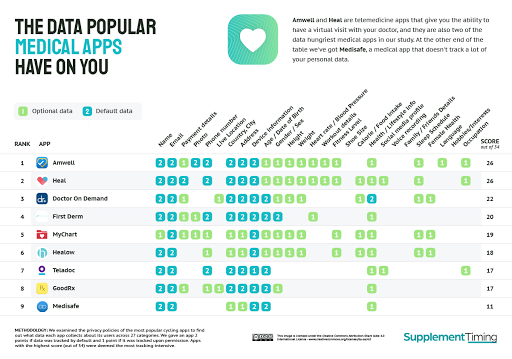We live in an era where our smartphones can count our steps, monitor our heartbeats, and even schedule doctor appointments. Healthcare apps promise convenience and a better lifestyle, but at what hidden cost? Beyond their sleek interfaces lies a significant concern: the safety of our personal health data. While trying to live a healthier life, are we inadvertently sacrificing our privacy?
Data breaches in healthcare apps
Healthcare apps have undeniably gained significant traction in the past few years, paving the way for a convenient and personalized health monitoring system. However, the flip side of this coin is the alarming rise in data breaches. With the increasing dependency on these apps, the volume of personal health data stored digitally has increased, creating an attraction for cybercriminals. Data breaches can lead to identity theft, financial fraud, and even medical impersonation, with dire consequences for the victim.
The healthcare sector is uniquely vulnerable to cyberattacks. A 2023 report by IBM revealed that the average cost of a data breach in healthcare was $10.93m in 2023, with an 8.2% growth, making it the highest among all industries. Disturbingly, in the last three years, the average cost of a data breach in the healthcare sector has surged by 53.3%, adding more than $3m to the average cost of $7.13m in 2020. This alarming trend underscores the urgent need for robust data protection measures in healthcare apps. These breaches could lead to unauthorized access to sensitive information like medical history, medication details, and even genetic data, which could be exploited for nefarious purposes.

How do these apps use your data?
Healthcare apps require tuns of personal data to function effectively. This includes demographic details, health and fitness metrics, medical history, and, in some cases, even genetic information. While such data is crucial for personalizing the app experience, the question remains, how is this data being used?
Primarily, healthcare apps use your data to provide personalized recommendations. For instance, a fitness app might analyze your workout routines and health metrics to suggest a tailored exercise plan. Similarly, a telemedicine app could use your medical history to facilitate virtual consultations. However, this is just the tip of the iceberg.
In reality, many healthcare apps monetize this data by selling it to third parties like pharmaceutical companies, insurance firms, and even marketing agencies. These entities mine this data for insights, often with the aim of targeted advertising or market research. Unfortunately, this commercial exploitation often occurs without the explicit consent of the user, raising serious privacy concerns.

Risks of sharing personal information in healthcare apps
The primary risk of sharing personal data with healthcare apps is the potential breach of privacy. Your intimate health details could be exposed to unknown entities, leading to a host of problems. For instance, health insurance companies could use this data to hike premiums or even deny coverage. Similarly, employers might access this data to make discriminatory decisions based on health conditions.
Another significant risk is that of identity theft. Cybercriminals could use stolen health data to impersonate the victim and commit medical fraud. This could lead to incorrect entries in the victim’s health records, affecting their future medical treatment. Moreover, it could result in financial fraud, with the criminal making fraudulent claims using the victim’s identity. Perhaps the most disturbing risk is the potential for psychological harm. The knowledge that one’s intimate health details have been exposed can cause significant distress. This breach of trust can also deter individuals from seeking necessary medical help due to fear of privacy invasion.

Case studies of compromised personal data
The past decade has seen numerous instances of healthcare apps compromising personal data. One of the most infamous cases was the 2015 breach of health insurer Anthem, where hackers stole the data of nearly 78.8 million users. The exposed data included names, birth dates, social security numbers, and healthcare ID numbers. Another case occurred in 2019, where a security flaw in the popular women’s health app Femm exposed the sensitive health data of millions of women. This breach highlighted the risks associated with sharing intimate health details with healthcare apps.
And more recently, in March 2022, a headline that made the news was Shields Healthcare Group, which experienced a breach affecting 2 million individuals. An unidentified hacker accessed their server from March 7-21. Though a security alert was raised on March 18, the compromise wasn’t confirmed immediately. The potential data exposed includes full names, social security numbers, addresses, and various medical details. This is just one among many case studies that emphasize the importance of robust cyber threat preparedness and response mechanisms in our increasingly interconnected world.
How to protect your data
While the risks are real and alarming, there are steps you can take to safeguard your data when using healthcare apps. Firstly, always read the app’s privacy policy before downloading. This will give you an idea of what data the app collects and how it uses it. Secondly, limit the amount of personal data you share with these apps. Only provide information that is necessary for the app to function. For instance, a fitness tracking app doesn’t need to know your full medical history.
Also, regularly update your apps to the latest version. App updates often include security patches that protect against known vulnerabilities. Using outdated versions can leave your data exposed to potential breaches. And last but not least, consider using encryption tools and VPNs to secure your data. These tools can provide an additional layer of security, making it harder for hackers to access your data. In the words of Edward Snowden, “Arguing that you don’t care about privacy because you have nothing to hide is like saying you don’t care about free speech because you have nothing to say.” Our health data is a deeply personal and sensitive aspect of our lives, and it’s time we gave it the protection it deserves.



